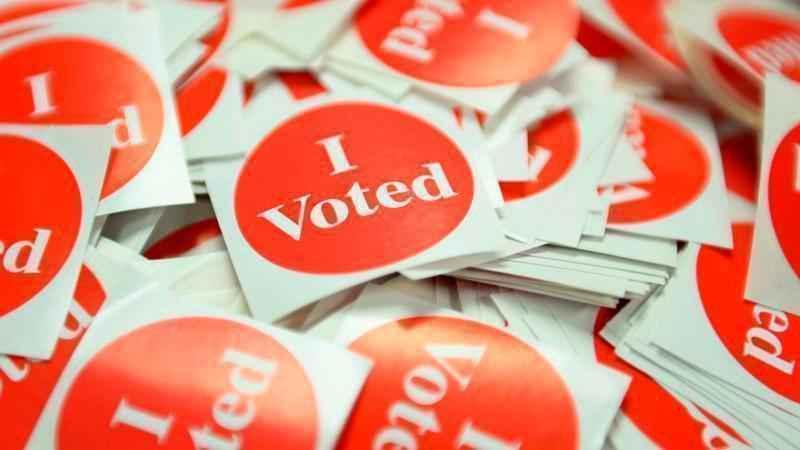Wisconsin audit finds elections are ‘safe and secure’

[AP/File]
A highly anticipated nonpartisan audit of the 2020 presidential election in Wisconsin released Friday did not identify any widespread fraud in the battleground state, which a key Republican legislative leader said shows its elections are "safe and secure."
The report from the nonpartisan Legislative Audit Bureau did make dozens of recommendations on how the state might improve its elections. It also determined that dozens of voting machines it reviewed worked correctly. Some conservatives have called for reviews of all voting machines.
"Despite concerns with statewide elections procedures, this audit showed us that the election was largely safe and secure," tweeted Republican state Sen. Robert Cowles, who co-chairs the Legislature’s Audit Committee, which assigned the audit bureau to conduct the review. "It’s my hope that we can now look at election law changes & agency accountability measures in a bipartisan manner based on these nonpartisan recommendations."
The audit didn’t offer any evidence that the election won by President Joe Biden was "stolen" from Donald Trump, as Trump and some fellow conservatives have falsely claimed. Biden’s roughly 21,000-vote win over Trump in Wisconsin has withstood recounts and multiple court rulings.
Democrats hailed the audit as evidence that elections are safe, secure and accurate, but said they feared Republicans would cherry pick the findings to sow distrust.
Republicans did seize on the fact that elections officials in Milwaukee County and the city of Madison — two liberal strongholds — along with the Town of Saumico did not turn over actual ballots. They cited guidance from the U.S. Department of Justice that elections officials are responsible for retaining and preserving election records, the audit said.
Republican Assembly Majority Leader Jim Steineke accused those clerks of "promoting secrecy" and undercutting their credibility.
In an unusual move, state auditors did not give elections officials subject to the review a chance to respond and have their comments be a part of the report. The Audit Bureau said it didn’t solicit comment because so many people were involved with the audit, it would have compromised the confidentiality of its work.
Meagan Wolfe, administrator of the Wisconsin Elections Commissions which oversees elections in the state, called the move a "missed opportunity" and that the agency was still reviewing the 168-page report to determine its response.
The report is one of two investigations in Wisconsin.
Republican Wisconsin Assembly Speaker Robin Vos ordered a second investigation after Trump criticized him for doing too little to scrutinize the election. That probe is being overseen by conservative former Wisconsin Supreme Court Justice Michael Gableman who said last year that he thinks the election was stolen.
On Thursday, Democratic Wisconsin Attorney General Josh Kaul asked a court to block a subpoena for Wolfe, the state’s top elections official, issued by Gableman. A judge set a Monday hearing on the request.
Gableman did not immediately respond to a message Friday seeking comment.
Kaul last week called the Gableman probe a "fake" investigation that should be halted.
Wisconsin is one of several states pursuing investigations into the 2020 presidential election.
The Audit Bureau report did identify inconsistent administration of election law based on surveys of ballots it reviewed across the state. It made 30 recommendations for the Wisconsin Elections Commission to consider and 18 possible legal changes for the Legislature to weigh.
Republican state Rep. Samantha Kerkman, the other Audit Committee co-chair, said the report will serve as a "blueprint" for the Legislature to address areas identified where current election law is not being followed.
"It is critically important that we restore trust in our elections process," she said.
For example, the audit said the elections commission should issue a rule, which would need legislative approval, saying whether local elections clerks can fill in missing information on absentee ballots or allow drop boxes.
The audit reviewed a sample of 14,710 absentee ballots that were cast in 29 municipalities across Wisconsin. It found that nearly 7%, or 1,022 ballots, had partial witness signatures; only 15 ballots did not have a witness address in its entirety; eight did not have a witness signature and three did not have a voter signature.
It also found that state law requires clerks to write their initials on absentee ballot certificates in certain situations, but fewer than 1% of the ballots reviewed were initialed.
The audit also found just 24 people who might have two active voter registrations and of those, only four who might have voted twice. The names of the four people, which weren’t included in the audit summary, were referred to the elections commission, which could forward them to local prosecutors.
The findings back up the fact that few cases of election fraud have been charged in Wisconsin. Only four cases have been brought to date, including one involving a man accused of having voted twice. It wasn’t immediately clear if that man’s case was among the four discovered by the audit.